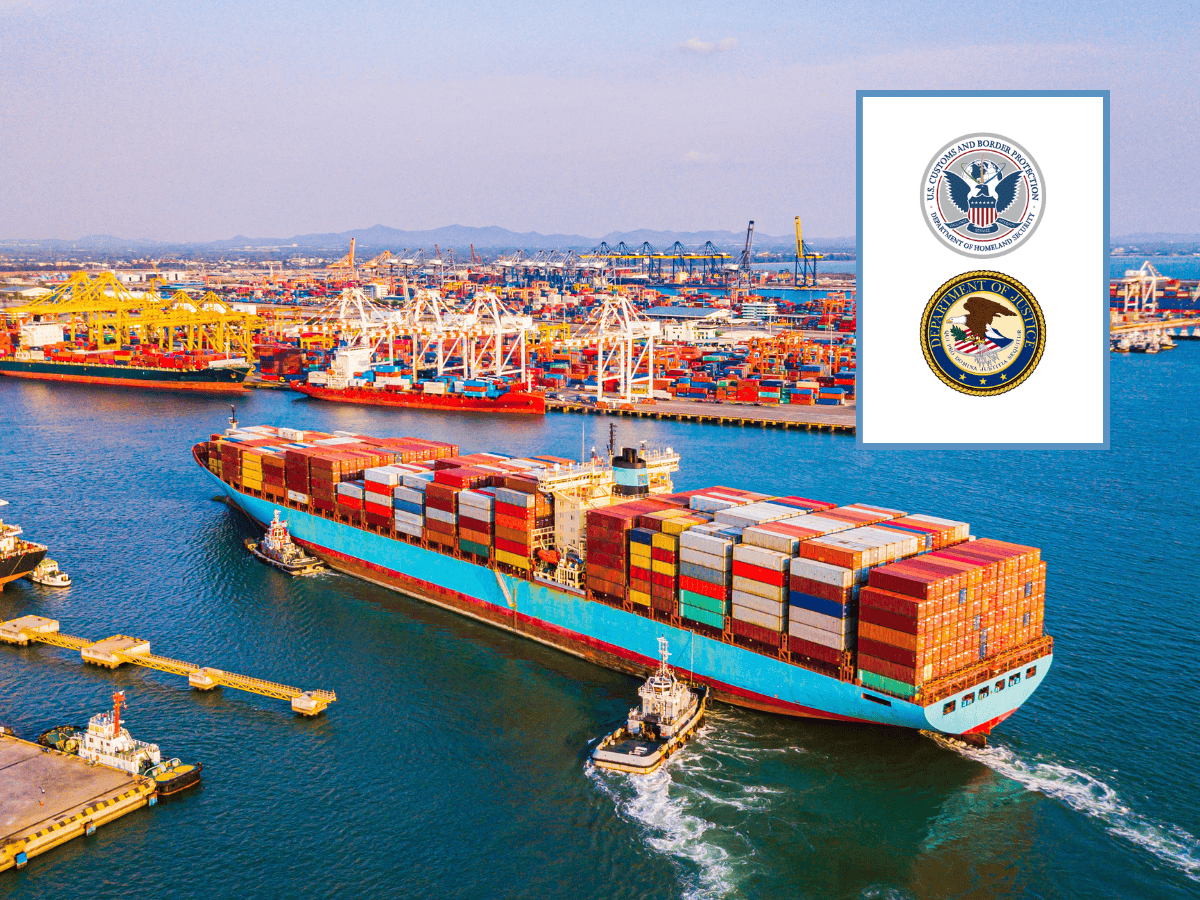Synopsis: The Trump administration’s widespread implementation of tariffs against every trading partner have prompted increased attempts to evade the tariffs, leading to greater enforcement by the federal agencies tasked with curtailing customs fraud, namely U.S. Customs and Border Protection and the Department of Justice.
Since taking office in late January, the second Trump administration continued the first administration’s penchant for making waves in the trade world. Specifically, with the publication of the America First Trade Policy on January 20, subsequent tariff actions against China, Mexico, and Canada, the April 2 “Liberation Day” reciprocal tariffs, and additional Section 232 actions targeting specific goods or industries, tariffs have arguably been the most impactful policy of the second Trump administration so far. But while the tariffs themselves make the headlines, the impact of the tariffs will be felt by certain importers only once the relevant federal agencies begin to enforce penalties against attempts to evade the tariffs.
Below, I will briefly discuss the primary federal statutes related to import violations and the agencies involved in the enforcement of these statutes, namely U.S. Customs and Border Protection (“CBP”) and the Department of Justice (“DOJ”).
CBP Enforcement
In the United States, the front line of tariff enforcement is CBP, an agency under the umbrella of the Department of Homeland Security. CBP enforces violations of 19 U.S.C. § 1592, which prohibits the importation or attempt to import merchandise by means of (1) material, false documents or electronic data or (2) material omissions.[1] Incorrect country of origin, undervaluation, Harmonized Tariff Schedule (“HTS”) misclassification, and improper claims of free trade agreement eligibility (e.g., incorrect U.S.-Mexico-Canada Agreement certifications of origin) are common § 1592 violations.
The statute gives CBP authority to impose penalties for violations and provides three levels of culpability: fraud, gross negligence, and negligence. For violations resulting in a loss of duty, the maximum statutory penalty for each level of culpability is as follows:
- Fraud: the domestic value of the merchandise.
- Gross negligence: the lesser of the domestic value or four times the loss of duties.
- Negligence: the lesser of the domestic value or two times the loss of duties.[2]
Since the implementation of the Section 301 tariffs on Chinese-origin goods in 2018, trade fraud, particularly related to Chinese imports, has increased. Goldman Sachs economists calculated that evasion of those initial tariffs, which impacted a much smaller universe of goods than the new 2025 tariffs, may have led to losses on the collection of duties of $110 billion to $130 billion.[3] In this environment of additional tariffs, fraudulent trade practices will increase.
Under § 1592, CBP can initiate its own investigations, which may be triggered by sudden changes in importer practices, requests for information from CBP, discoveries during CBP audits, and other means. Employees, competitors, and other third parties may alert CBP to suspected duty evasion schemes through CBP’s online e-Allegations portal.[4]
DOJ Enforcement
The DOJ may become involved in civil customs enforcement in a few ways. The first is as a final backstop to collect penalties issued by CBP once a matter has run its course in the administrative realm. It can often take several months or even years for an importer to exhaust its options to challenge penalties in a §1592 case. These options include the presentation of a written or oral response to a pre-penalty notice, a petition to mitigate the penalty amount, and a further supplemental petition.[5] However, if CBP continues to hold an importer liable for a penalty amount and is unable to collect from the importer, it has one of two options to escalate: 1) submit the penalty to the Treasury Offset Program for collection, or 2) refer the case to the DOJ for litigation.[6]
The DOJ can also act on behalf of CBP in litigation or settlement actions. The most famous – or infamous – recent example of the DOJ acting in this role is in a settlement agreement with the Ford Motor Company in which Ford agreed to pay $365 million to resolve penalties related to the alleged HTS misclassification and undervaluation of approximately 162,833 cargo vans imported into the United States.[7] In that case, the DOJ alleged that Ford engaged in a scheme involving the importation of cargo vans from Türkiye with sham rear seats to make the cargo vans appear to be passenger vehicles, which have a much lower duty rate.
Lastly, DOJ may enforce against tariff evasion through the False Claims Act (“FCA”), which is typically enforced in the context of a party fraudulently claiming money from the U.S. government related to government contracting activities. However, the FCA may also apply to cases where a party has knowingly avoided making owed payments to the government. This latter application, called “reverse false claims,” imposes liability on parties that evade duties for imported merchandise.[8] Importantly, the FCA contains qui tam provisions, allowing for whistleblowers with knowledge of fraudulent behavior to initiate lawsuits under the FCA on behalf of the United States.[9]
Recent comments and publications from DOJ personnel signal that the growing trend towards more frequent application of the FCA to customs cases will continue under the second Trump administration. For example, at a Federal Bar Association conference on qui tam litigation in February, Deputy Assistant Attorney General Michael Granston stated that the DOJ would “aggressively” pursue FCA investigations and that battling “illegal foreign trade practices” would be one of the agency’s major areas of focus. On May 12, the DOJ confirmed this stance in writing when it listed “trade and customs fraud, including tariff evasion” second on its list of priority areas for investigating and prosecuting white collar crime.[10]
Trump’s DOJ has already begun actively participating in FCA cases in his second term, albeit related to existing duty orders or tariffs initiated in the first Trump administration. On April 18, 2025, the DOJ announced its filing of an intervenor complaint in a case involving allegations of customs fraud against importer Barco Uniforms, Inc., companies that supplied Barco, and the operators of the supplier companies. The supplier companies manufactured uniforms in various countries, including China. The FCA complaint alleges a conspiracy between the defendants to fraudulently undervalue imported goods purchased by Barco, including through a “double-invoicing scheme” whereby the supplier companies provided one set of invoices to Barco reflecting the correct value of the imported merchandise and another “dummy” set of invoices to CBP with artificially lower values. A former Barco employee initially filed the case under the qui tam whistleblower provisions of the FCA prior to intervention by the DOJ.[11]
Similarly, on March 25, 2025, the DOJ announced it had reached a settlement with Evolutions Flooring, Inc., an importer of Chinese-origin multilayered wood flooring, and its owners to resolve allegations that Evolutions had illegally evaded antidumping and countervailing duties[12] and Section 301 duties on the Chinese imports. The FCA complaint included allegations that Evolutions knowingly avoided proper payment of customs duties by misrepresenting the country of origin of the merchandise on documents submitted to CBP. Under the terms of the settlement, Evolutions will pay $8.1 million to resolve the FCA claims. The whistleblower in this case was a competitor company rather than an employee, and the competitor whistleblower will receive approximately $1,215,000 of the settlement proceeds.[13]
DOJ’s involvement in Customs cases, both through FCA claims and otherwise, are unlikely to abate in the near future. Increasing tariff actions and rising costs of duties will continue to incentivize some importers to avoid the application of tariffs through illicit means. Navigating the sheer scale of tariffs is a difficult – and sometimes impossible – task, especially for small and medium-sized importers. But navigating a penalty claim from CBP or prosecution from DOJ is a much more complicated, expensive, and reputationally harmful ordeal.
[1] 19 U.S.C. § 1592(a)(1)(A).
[2] 19 U.S.C. § 1592(c)(1)-(3).
[3] Stella Yifan Xie & Pak Yiu, China’s Formidable Logistics Sector Challenges Trump Tariff Enforcers, Nikkei Asia, Apr. 11, 2025, https://asia.nikkei.com/Spotlight/Policy-Asia/China-s-formidable-logistics-sector-challenges-Trump-tariff-enforcers.
[4] E-Allegations Program, U.S. Customs and Border Protection, https://www.cbp.gov/trade/e-allegations (last visited May 13, 2025).
[5] 19 U.S.C. § 1592(b)(1)(vii); 19 C.F.R. § 171.2, 171.63.
[6] CBP Needs to Improve Its Oversight and Monitoring of Penalty Cases, Office of the Inspector General, 3 (Sep. 3, 2024), available at https://www.oig.dhs.gov/sites/default/files/assets/2024-09/OIG-24-49-Sep24.pdf.
[7] U.S. Dep’t Justice, Press Release: Ford Motor Company Agrees to Pay $365M to Settle Customs Civil Penalty Claims Relating to Misclassified and Under-Valued Vehicles (Mar. 11, 2024), https://www.justice.gov/archives/opa/pr/ford-motor-company-agrees-pay-365m-settle-customs-civil-penalty-claims-relating.
[8] 31 U.S.C. § 3729(a)(1)(G).
[9] 31 U.S.C. § 3730(b).
[10] Memorandum from Matthew Galeotti, Head of the Criminal Division, U.S. Department of Justice, Focus, Fairness, and Efficiency in the Fight Against White-Collar Crime, 4 (May 12, 2025), available at https://www.justice.gov/opa/media/1400141/dl?inline.
[11] U.S. Dep’t Justice, Press Release: United States Files Complaint Against Barco Uniforms & Suppliers (Apr. 18, 2025), https://www.justice.gov/opa/pr/united-states-files-complaint-against-barco-uniforms-and-its-suppliers-alleging-false-claims.
[12] For more information about antidumping and countervailing duties, see Olga Torres and Derrick Kyle, Are My Products Subject to Anti-Dumping/Countervailing Duties?, Torres Trade Law Insights, https://www.torrestradelaw.com/posts/Are-My-Products-Subject-to-Anti-045%3BDumping%40Countervailing-Duties/113 (Aug. 1, 2023).
[13] U.S. Dep’t Justice, Press Release: Evolutions Flooring Inc. and Its Owners to Pay $8.1 Million to Settle False
Claims Act Allegations Relating to Evaded Customs Duties (Mar. 25, 2025),



